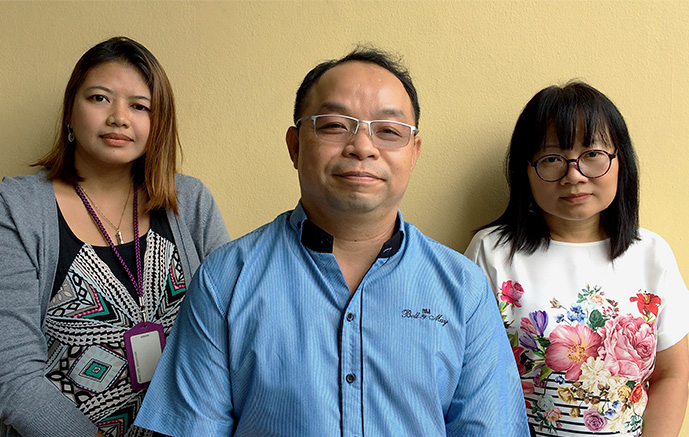For this month’s e-newsletter, FORUM-ASIA shines a light on individuals who work tirelessly behind the scenes to promote and protect human rights. Wichai Prabpaln, Phasuk Riantub and Panadda Prakkamakul are from FORUM-ASIA’s Finance Team, and share with us how they got involved with FORUM-ASIA, and how meaningful they find their work and the contribution it makes to realising human rights for all.

Why did you decide to work for FORUM-ASIA?
Wichai: The non-profit sector is very different from the corporate field I used to work in. I joined FORUM-ASIA because I wanted to learn more about human rights and human rights organisations, as well as meet different kinds of people from different fields of work.
Panadda: I, too, joined FORUM-ASIA to learn more about human rights and gain new experiences. Prior to FORUM-ASIA, I worked with a few Thai non-governmental organisations (NGO) that championed community development. But this is my first time working in an international NGO.
Phasuk: For me, I wanted more experience with human rights. Previously, I worked for other international NGOs, including Plan International. These organisations focus on children’s rights or forestry. I had never worked specifically on human rights, but this was an area I wanted to learn more about.
Were you interested in or involved with human rights before joining FORUM-ASIA?
Phasuk: I was interested in human rights before joining FORUM-ASIA, because my experience with Plan International made me realise children’s rights are fundamental to realising human rights.
Wichai: I was never involved in human rights work prior to FORUM-ASIA, but always had an interest to learn more about it. My work now at FORUM-ASIA is exposing me to opportunities to learn more about human rights.
Panadda: Similar to Wichai, I wanted to learn more about human rights. The field of work I was in, community development, is related to human rights although not directly so. That is where my interest in human rights developed.
Please tell us one of the most inspiring/best moments for you working with FORUM-ASIA?
Wichai: The best moment for me in FORUM-ASIA is when our work in finance and budgeting is recognised and appreciated. Working with other FORUM-ASIA Programmes and knowing that our work makes a difference is fulfilling. I am learning a lot of new things through FORUM-ASIA.
Phasuk: I agree! It is the best feeling when our work is realised. There is increasingly more importance placed on finance and budgeting, and that is where we come in. Last year, when I was shown a video of the challenges faced by the Rohingya community, it made me realise how all of us are fighting for the same cause—human rights. I felt good knowing the work I do, through finance, contributes to ongoing efforts to realise human rights for all. One thing I learned from my experience in FORUM-ASIA is that it is equally important for me to protect my own rights while respecting the rights of others.
Panadda: It is the learning experience that is the best part about working with FORUM-ASIA. I am learning a lot about human rights. I started from zero knowledge on human rights, even though I knew it was linked to community development. I think I have learnt a thing or two about international human rights since then!
What do you experience as the main challenge in working with FORUM-ASIA?
Wichai: I received a promotion and was appointed the Finance Manager of FORUM-ASIA. With a promotion comes more responsibilities—I want to ensure I perform my duties well. Initially, this was challenging because I was unsure of organisation-specific managerial duties. But I learnt on the job and am constantly giving it my best.
Panadda: My biggest challenge is with the language barrier. In my previous jobs in local NGOs, communications were in my mother tongue. In an international organisation, however, everything is in English.
Phasuk: The language of advocacy in my previous jobs was easier to understand. After all, no one can dispute the need to protect children’s rights. But the vocabulary of human rights, especially at international level, is very different. There are many inter-sectionalities in international human rights. I am still learning the vocabulary of human rights. It is easier in terms of my specific duties as part of the Finance Team, though, because it is the same terminology as with my previous finance jobs.
If you could give a message to other people about why you think the work of FORUM-ASIA is important, what would it be?
Phasuk: FORUM-ASIA’s work is important because we strive to guarantee the rights of all people and we engage with civil societies across the region through our members. Without organisations like FORUM-ASIA, there would be no one to convey the message that it is important to guarantee the rights of people everywhere. Human rights is inherent from birth, but people often do not realise that. We need more people to understand and realise the importance of their rights, if we want to work towards achieving universal human rights.
Wichai: FORUM-ASIA plays a pivotal role in creating regional solidarity because we are membership-based, with over 80 human rights organisations in the region as our members. We collect information from our members and coordinate communication between human rights practitioners in the region. In short, FORUM-ASIA’s work contributes greatly to regional solidarity for human rights.
Panadda: I aspire to expand people’s awareness on FORUM-ASIA’s work, and human rights as a whole. It is important to raise awareness about human rights, especially in Thailand’s constricted civic space. In Thailand, only very few organisations are able to carry out work focusing on civic space. I also hope more organisations join FORUM-ASIA as members, so we can collectively work towards achieving universal human rights.


